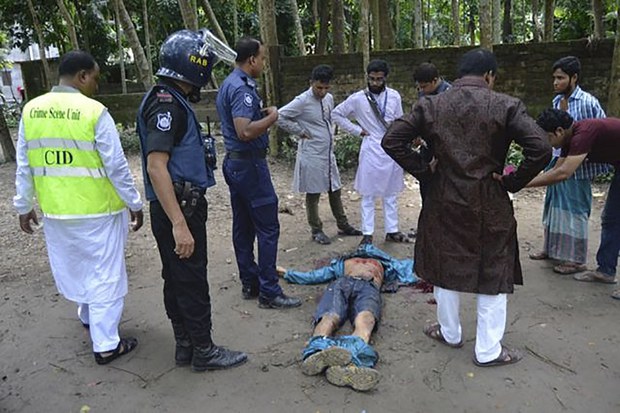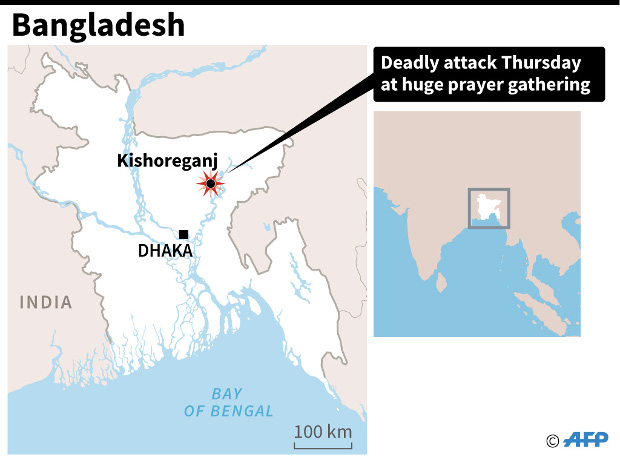Four Die in Eid Holiday Attack in Bangladesh
2016.07.07
Dhaka
 Bangladeshi policemen surround the body of a suspected militant following an attack near Bangladesh’s largest Eid gathering in Kishoreganj district, July 7, 2016.
Bangladeshi policemen surround the body of a suspected militant following an attack near Bangladesh’s largest Eid gathering in Kishoreganj district, July 7, 2016.
Updated at 3:35 p.m. ET on 2016-07-07
Two policemen were killed and nine others wounded when militants set off explosives at a security roadblock near a site in northwestern Bangladesh where hundreds of thousands of worshipers gathered Thursday for the country’s largest Eid-ul-Fitr prayer service, authorities said.
A civilian and a suspected militant were killed in a shootout during the attack in Kishoreganj district, which marked the second deadly terrorist strike in Bangladeshi in a span of six days, officials said.
The latest attack came as Bangladeshi Muslims were celebrating the end of Ramadan and a day after a video surfaced online in which Bengali-speaking members of the extremist group Islamic State (IS) warned of more attacks to come in Bangladesh, after last Friday’s IS-claimed attack on a restaurant in Dhaka’s diplomatic quarter killed 28 people, including 20 hostages.
As many as eight suspected militants took part in Thursday’s attack on a roadblock about a kilometer from the Sholakia Eidgah, an open field that has served as a venue for the mass prayer service for decades, police said. They said the militants attacked the police post with machetes and home-made bombs. Two suspects were arrested and five other people were taken in for questioning.
Some of the suspects may have escaped, A.K.M. Shahidur Rahman, a deputy inspector-general (DIG) of police in Dhaka, told BenarNews.
“The police counter-fired, encircling the whole area. One of the attackers died while the others entered into the nearby houses and started shooting at the police. One woman, Jharna Rani Bhowmick, received a [fatal] bullet wound inside her house,” he said.
The two slain officers were identified as Zahirul Haque and Md Ansarullah. The nine injured officers were taken in critical condition to a military hospital in Dhaka, about 130 km (80 miles) away, according to reports.
Rahman said police were investigating the latest attack but had no information about whether it is linked to the July 1 attack on the Holey Artisan Bakery café in Dhaka.
Cleric Farid Uddin Masud, who was to serve as the imam for Thursday’s prayer service in Kishoreganj and who had led a recent drive to collect 100,000 signatures from fellow clerics and religious scholars for a fatwa – or religious decree – denouncing militancy in Bangladesh, might have been potentially targeted for assassination in the latest attack, according to Rahman.
“The police have told me that I was the target of the militants. I am not afraid of it. I will continue to fight against militants through the peaceful message of Islam,” Masud told BenarNews.
“I want to make this call to the militants: the path you have chosen is not the path of heaven; it is the path of hell. Please shun the destructive path and come to the path of peace. Islam is a path of peace, not violence,” the cleric added.
‘There was an explosion’
The annual Eid service at the Sholakia Eidagh grounds, near the town of Kishoreganj, is the country’s largest Eid festival and draws hundreds of thousands of people each year.
Attendance at the prayer service usually ranges from 300,000 to 500,000 worshipers, Masud said.
The attack occurred at around 9:45 a.m. (local time) – 15 minutes before the service was scheduled to start – when militants with explosives and machetes attacked the two policemen at the security post, DIG Rahman said.
Liton, a man from Dhaka who was among the throng of worshipers, witnessed the attack.
“I was just 100 meters [328 feet] from the spot. Some six to seven youths suddenly attacked the group of police posted near the Mosque adjacent to the Azimuddin School. There was an explosion and people started dispersing in all directions for safety. Some of the bearded attackers carried machetes with them,” Liton told BenarNews, adding that he dropped to the ground to protect himself and later fled the scene.

‘Threat is real and credible’
The attack occurred as Bangladeshis were still reeling from Friday’s deadly siege at the café in Dhaka’s exclusive Gulshan 2 neighborhood, which was the nation’s worst-ever terrorist attack. The death toll in the overnight standoff that ended on Saturday morning with security forces storming the building included two senior police officers, at least five militants, and 20 hostages.
Nine Italians, seven Japanese, an Indian, two Bangladeshis and a dual U.S.-Bangladeshi citizen were among hostages who were hacked to death by the attackers, most of whom turned out to be educated young men from Bangladesh’s elite.
One of the attackers was captured alive and a sixth man was shot dead by police as they stormed the café on Saturday. Earlier this week, police said that the sixth man, Saiful Islam Chowdhury, who was employed as a pizza maker at the restaurant, may have been mistaken for one of the terrorists when he was shot. But on Wednesday, police announced that Chowdhury may have in fact collaborated with the attackers.
On Thursday morning in Washington, the U.S. State Department issued an alert for its citizens travelling to or living in Bangladesh.
“The U.S. government assesses that the terrorist threat is real and credible,” said the alert, which mentioned last week’s attack but not the one that took place near the site of the prayer service on Thursday.
Later on Thursday, the American embassy in Dhaka posted a message on its website notifying U.S. citizens of the attack in Kishoreganj and warning them to stay away from that area.
Economic fallout
Apart from the human toll, last week’s attack may have also harmed Bangladesh’s economy, which relies heavily on garment exports and on foreign aid for the country’s development, according to reports.
Some of the victims of the attack included a group of Italian designers and buyers for European stores, and apparel companies have been rethinking travel plans to Bangladesh, the Associated Press reported.
The seven Japanese who were among other diners slain in the attack were aid workers, reports said. Japan represents the single biggest donor of foreign aid to Bangladesh.
The café attack and a spate of attacks by religious extremists who have killed dozens of secular writers, intellectuals and minorities in Bangladesh since early 2013 “could have a significant economic impact – which may well have been in part, the intention,” Gareth Price, a South Asia expert with Chatham House, a think-tank in London, wrote in an op-ed piece published in the Indian Express newspaper on Wednesday.







